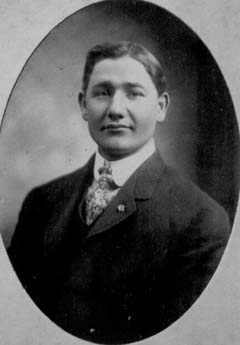
Moses Epstein Olliff, photograph ca. 1920, Jacksonville, FL |
| Analysis of L226 STAR & Descendants |
|
SUMMARY OF YSNP (May, 2016)
Defintion of L226 STAR: L226 STAR equates to L226 positive and negative for all sons. For L226, there is currently only one son, FGC5660. Therefore, this branch includes only submissions that are L226 positive and FGC5660 negative. Classification of Branch: Fairly small but very old branch - son of L226 Known sons: FGC5660 is the son of L226. Estimated Breadth of branch (speculative estimate of positive submissions): currently around six but scope will probably expand some with new testing of YSNPs and improvements in the SAPP tool. Scope of Testing within Signature: One Big Y test and one FTDNA SNP pack. Dominant Surnames (including variants): Wallace (2), Thomson (1), Manus (1), Walker (1) and Bryant (1). Date that branch was discovered: Unknown. Source of Branch discovery: One FTDNA Big Y test (174394). Number of Negative Broad Tests: Around 45 Big Y results and 30 more via packs & panels and several more individual YSNP tests. Number of Negative Tests within Signature: None known. Pending Tests (within signature): None known.
ANALYSIS OF CURRENT L226 STAR HAPLOTREE I manually separated around 110 L226 submissions combined with 23 known YSNP results and then used the SAPP tool to generate a chart which matched the scope found from my manual analysis. Even with the lack of the ability to enter more data into the SAPP tool, it is predicted that matched my manual analysis. The SAPP tool did recognize the progression of YSTR mutations and had no submissions that did not match my manual analysis. This branch had substantially large signature with few matches. Due to its genetic isolation, the SAPP tool was an exact match to my manual analysis. The SAPP did its usual excellent job of identifying many close matches that were included in the haplotree. This branch of L226 STAR has several issues preventing the complete descendant chart of L226 STAR: 1) Since there was submissions to analyze, I first looked at the signatures of these two submissions and determined that they had very good signatures associated with these submissions. These large signatures were enough information to reveal a pretty clear evolution of YSTR mutations. The SAPP did a very good job with all the branching information due to the genetic isolation of the two submissions. The scope of scope of L226 STAR is probably somewhat larger that what manual analysis or SAPP tool can find since it is a very old branch that produces very large signatures that will not be discovered until more YSNP testing is completed. 2) The current limit of around 100 submissions limits the accuracy of the descendant chart for this particular L226 branch. As more submissions can be entered into the SAPP tool, as new branches are discovered and as more YSNPs are tested, several more submissions will be included under the L226 STAR branch over time. 3) However, between my manual analysis and the SAPP tool, three good testing candidates were revealed. Again, the SAPP tool does an excellent job in making the L226 STAR haplotree much more bushy by finding close matches.
OTHER FUTURE YSNP TESTING No pending tests are known.
L226 STAR Haplotree The link to the haplotree chart is the best way to look at the evolution of the L226 STAR haplotree. It is visually much easier to follow than spreadsheets and is very close to a genealogist descendant tree charts that genealogists already are well trained in analyzing:
Testing Candidate Recommendations
This summary will attempt to priortize testing and explain why each test is beneficial to the the verification of the L226 STARbranches. Here are the priorities for testing: 1) It is recommended that all current submissions that are predicted positive for the L226 STAR should test FGC5660 . It is recommend that FGC5660 should be tested for $17.50 per YSNP from YSEQ due to much lower costs. Below are the recommended tests L226 STAR submissions via individual YSNP tests: Predicted L226+, FGC5660- 2) Once the above testing candidates are confirmed for their status of FGC5660, it is recommended that these submissions next test the private YSNPs associated with the NGS tester of this branch. These YSNPs will need to added to the YSEQ list of individual YSNPs and can be ordered via the Wish a SNP request form (cost of $1 per YSNP). Once these YSNPs become available for ordering, the first phase of testing for new branches to be discovered (as well as testing new FTDNA branches) would be: For all L226 STAR testing candidates Few of these new YSNPs are currently available for order from FTDNA as individual YSNP orders and I can not verify if they are orderable via the haplotree interface since I test postive for FGC5660. However, even if they are available for ordering, two YSNPs from FTDNA costs $78 or four YSNPs from YSEQ cost $70 and could discover a new branch vs. just testing a new branch that FTDNA has added. Private YSNPs should not be ordered unless you have confirmed the results of FGC5660 branches by completing the recommended testing listed above. You could order all YSNPs at the same time, but if FGC5660 tests positive, all other testing will have no value. After the first phase of testing private YSNPs, additional private YSNPs will be recommended during phase two of testing private YSNPs. As test results for these private YSNPs become known, the recommended list will change over time based on the testing results received. Testing private YSNPs is speculative testing for the discovery of new branches as well as confirming known branches. Discovery of new branches has similar risks as the Big Y test but at much lower costs. However, Big Y testing will always discover yet more private YSNPs where testing existing private YSNPs will never discover any new private YSNPs.
|